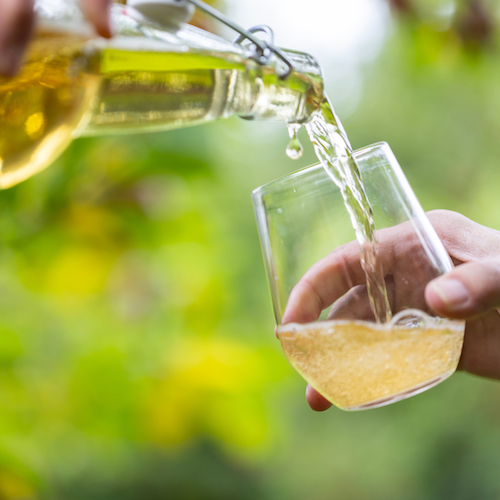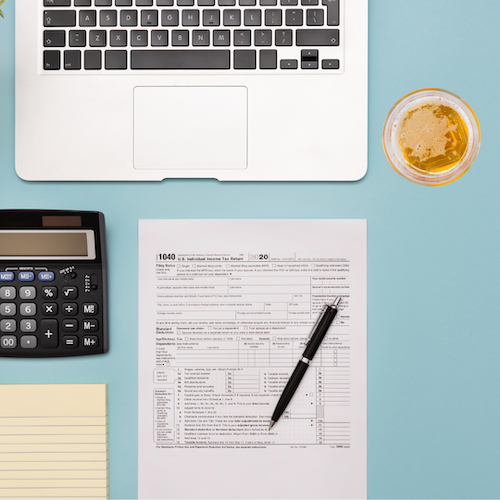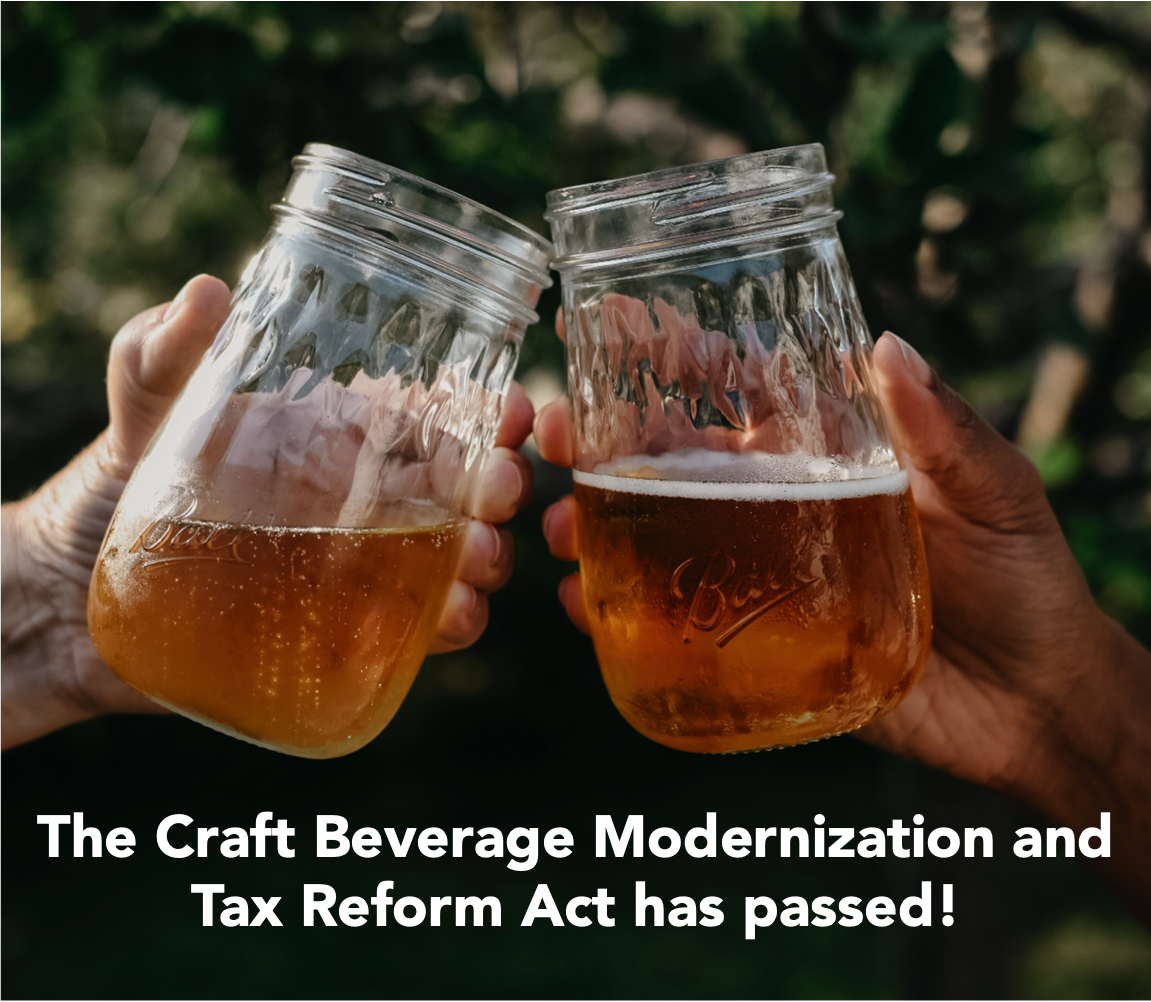Taxes
Urge Congress to Support the Bubble Bill
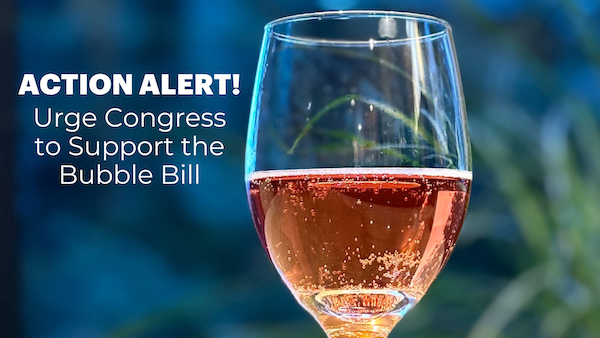
Earlier this year Representatives Earl Blumenauer (OR-D) & Mike Kelly (PA-R) introduced the Bubble Tax Modernization Act of 2024 (HR 7029) to the 118th Congress. Since then Representatives Suzanne Bonamici (OR-D), Andrea Salinas (OR-D), Lori Chavez-Deremer (OR-R), and Val Hoyle (OR-D) have signed on as co-sponors of the legislation. The “Bubble Bill” will amend a minor carbonation tax disparity for lower alcohol wine, cider and mead made with fruit. Read the complete bill here.
Despite the popularity of bubbly beverages, the carbonation tax–colloquially called the ‘bubble tax’ on fruit wine, fruit cider, and fruit mead makes carbonating these agricultural products at sparkling levels cost prohibitive. Most craft beverage entrepreneurs can’t afford to carbonate these products at the level the market wants. The result is that an important American agricultural sector is falling flat.
Current tax rates for low-ABV carbonated fruit wine, cider, and mead are $3.30 or $3.40 per gallon. Meanwhile low-ABV carbonated grape wines have a current tax rate of $1.07 per gallon. In addition, fruited beers, seltzers, hard kombucha, and ready-to-drink canned cocktails are carbonating freely to give consumers the bubbles they want.
Raising the floor of the carbonation tax threshold to include ALL low-ABV wine, cider, and mead to 0.64 grams of carbon dioxide per hundred milliliters will allow producers to compete more fairly in the evolving beverage market. The Craft Beverage Modernization and Tax Reform Act of 2020 achieved this for grape-only wines, but fruit-based craft beverages were overlooked. This created an excise tax disparity of $2.00 to $3.00 a gallon depending on the product. For more information download the Understanding Bubble Taxes explanatory document.
Allowing more carbonation will foster more economic opportunities for craft beverage makers, allow for more small producer collaborations, create increased opportunities for farms to stay viable with value-added products, and allow for diversification that could help farms and businesses mitigate disasters such as fires, droughts, floods, or crop disease.
Please ask your Congressional representatives to sign onto the Bubble Bill today to support American craft beverage producers and manufacturers.
Reps. Blumenauer & Kelly Introduce Bubble Bill
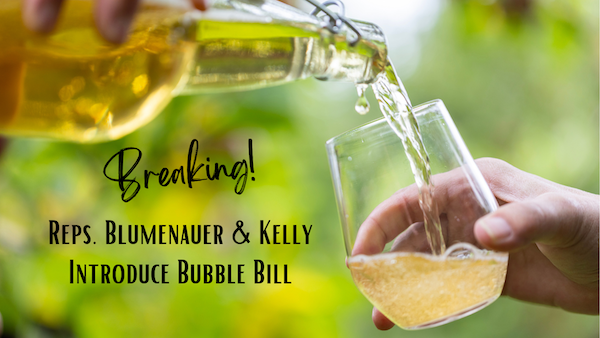
Representatives Blumenauer & Kelly Introduce the Bubble Tax Modernization Act
‘Bubble Bill’ Will Spur Innovation for Sparkling Co-fermented and Fruited Cider, Wine, and Mead
Washington, DC—Earlier today Representatives Earl Blumenauer (OR-D) & Mike Kelly (PA-R) introduced the Bubble Tax Modernization Act of 2024 (HR 7029) to the 118th Congress. The bill will amend a minor carbonation tax disparity for lower alcohol wine, cider and mead made with fruit.
Despite the popularity of bubbly beverages, the carbonation tax–colloquially called the ‘bubble tax’ on fruit wine, fruit cider, and fruit mead makes carbonating these agricultural products at sparkling levels cost prohibitive. Most craft beverage entrepreneurs can’t afford to carbonate these products at the level the market wants. The result is that an important American agricultural sector is falling flat.
“The cider industry is a quintessential American story. Pioneers taking what the land gives them and creating something magical. We must take every opportunity to support cidermakers, especially as the craft beverage industry recovers from the ravages of the pandemic. Right now, it is not a level playing field for cider, which is taxed more heavily than other carbonated, fruit-based beverages. My common-sense proposal will ensure cidermakers can create products for their customers, not the tax collector,” Rep. Blumenauer says.
Amie Fields, partner and sales manager at Botanist & Barrel Cidery & Winery in North Carolina, says the bill will enable innovation for their business.
“We are known for creativity and producing unique pet nats and bottle conditioned cider and wine with a range of ABVs, but recently we have been working on a series of lower alcohol content beverages. However, the carbonation tax currently disincentives our creativity, which hampers our ability to fully explore more sessionable beverages and boost our revenue by appealing to new customers,” explains Fields.
Current tax rates for low-ABV carbonated fruit wine, cider, and mead are $3.30 or $3.40 per gallon. Meanwhile low-ABV carbonated grape wines have a current tax rate of $1.07 per gallon. In addition, fruited beers, seltzers, hard kombucha, and ready-to-drink canned cocktails are carbonating freely to give consumers the bubbles they want.
Raising the floor of the carbonation tax threshold to include ALL low-ABV wine, cider, and mead to 0.64 grams of carbon dioxide per hundred milliliters will allow producers to compete more fairly in the evolving beverage market. The Craft Beverage Modernization and Tax Reform Act of 2020 achieved this for grape-only wines, but fruit-based craft beverages were overlooked. This created an excise tax disparity of $2.00 to $3.00 a gallon depending on the product.
Blumenauer’s legislation will address this disparity by changing how carbonation taxes are assessed. It will reduce a barrier for more innovative cider, fruit wine, and mead. In addition, it will create more economic opportunities for craft beverage makers, allow for small producer collaborations, create more opportunities for farms to stay viable with value-added products, and allow for diversification that could help farms and businesses mitigate disasters such as fires, droughts, floods, or disease.
HR 7029 is supported by the American Cider Association, the American Mead Makers Association, and Wine America.
###
The American Cider Association is an organization of cider and perry producers in the United States. Our mission is to grow a diverse and successful U.S. cider industry by providing valuable information, resources, and services to our members and by advocating on their behalf. You can learn more about them at www.ciderassociation.org.
Additional Employee Retention Credit Eligibility & Other Tax Planning Opportunities – What Your Cidery and Accountant May Not Have Considered
Hey ACA members! Get your calculators ready and join us for an informative webinar on November 14 at 2:00 PM Pacific!
Many businesses took advantage of COVID-19 relief programs such as PPP and EIDL, but many more are still missing out on funds from the Employee Retention Credit (ERC) and have not filed for all quarters in which they are eligible (up to 7 quarters). Eligible employers who paid qualified wages can claim up to $26,000 per employee in refundable tax credits. Another missed opportunity occurs when companies do not effectively utilize tax planning strategies. These strategies include the work opportunity tax credit, research and development credit, planning for long-term sustainability, bonus depreciation, and business expenses. Join Strategic Tax Planning, a licensed CPA firm for a discussion on the common tax planning techniques that could increase your business’s after tax cash flow.

Tina Azarvand
Tina joined Strategic Tax Planning and is a Tax Manager with the firm. While working as a Tax Attorney, Tina became interested in the Employee Retention Credit through the ever-evolving legislation, where she decided to shift her focus to assisting small businesses with ERC while it is available.
As a Tax Attorney, Tina focused on assisting individuals and businesses facing tax controversies with the IRS and local taxing authorities. In 2022, Tina was selected to the SuperLawyers: Rising Stars list and the Best Lawyers: Ones to Watch list, both of which are distinctions given to less than 3% of the attorneys in each respective state. Tina was also selected as the Maryland Volunteer Lawyers Service (MVLS) Young Volunteer of the Year for 2022.
August 2021 Covid Relief Updates
There’s been some changes in the SBA Covid Relief Programs recently. Read below to learn more about these changes and how they might impact your business.
PPP Loan Forgiveness
The Paycheck Protection Program (PPP) loan period ended May 31, 2021. Existing borrowers may be eligible for loan forgiveness for all of their PPP loan. Loan forgiveness for both First and Second Draw PPP loans are available if the following criteria is met:
- Employee and compensation levels were maintained for the 8-24 week covered period.
- The loans were spent on payroll and other eligible expenses.
- At least 60% of the proceeds went to payroll costs.
Businesses can apply for loan forgiveness as soon as all the loan proceeds have been used.
Many lenders have signed on to the Direct Forgiveness Portal set up by the SBA to streamline the loan forgiveness process. You can download an Excel spreadsheet HERE to see if your lender has signed up for the Direct Forgiveness Portal. Contact your lender directly for their loan forgiveness program if they have not joined the portal. All businesses applying for forgiveness will have to submit information regarding the use of the PPP loan proceeds they received. You can read more about what documentation you will need to provide HERE.
Shuttered Venue Operators Grant
Note: The deadline to apply for the Shuttered Venue Operators Grant (SVOG) is Friday, August 20, 2021 at 11:59pm Pacific Time. Later in August, those that receive an SVOG will be able to apply for a supplemental grant up to 50% of the original award amount.
The SVOG is available to businesses that support the arts, including venues with live music or performing arts. Businesses that received PPP loans are eligible to apply for the SVOG grant. You can download the Frequently Asked Questions PDF HERE.
Eligible applicants may be able to receive grants up to 45% of their gross earned revenue up to a maximum of $10 million.
Employee Retention Tax Credit
The Employee Retention Tax Credit (ERTC) was created as part of the CARES act to encourage employee retention during the COVID-19 pandemic. The ERTC allows qualified business to claim up to 70% of the first $10,000 in pay and health benefits in each quarter for which they qualify.
It has been extended several times and was set to expire December 31, 2021. The current national infrastructure bill that is before Congress now would end the ERTC early, changing the expiration date to September 30, 2021 if the bill passes before then.
Businesses may also apply retroactively for the credit for previous quarters dating back to the beginning of the pandemic. A rule change also allows businesses who received PPP loans to claim the ERTC and can be claimed retroactively as well. In addition, “recovery startup businesses” (being those that opened after February 15, 2020) will still qualify for the ERTC until the end of the year.
Cider Tax News
UPDATE: On 12/27/20 President Trump signed the bill making the reform included in the CBMTRA permanent.
On Monday night, Congress took the important step to pass permanent Federal excise tax credits for the nation’s cideries, meaderies, wineries, breweries, and distilleries. The tax reform measures for alcohol producers were originally introduced on a two-year basis in 2017 and renewed for one year late in 2019. The renewal was set to expire on December 31, 2020, but thanks to the inclusion of the Craft Beverage Modernization and Tax Reform Act (CBMTRA) in the most recent COVID relief bill, the excise tax credits are now permanent. The transition from temporary tax bill to permanence was relatively rapid thanks to enormous bipartisan popularity in both the Senate and House of Representatives as well as unprecedented collaboration of cider, wine, beer, spirits, and mead.
The bill removes prior barriers to growth by increasing the defining production threshold of a small cidery or winery and maintaining tiered tax credits as cideries grow and meet those thresholds.
“Many cideries feared exceeding the original small producer threshold. The permanent passage of the CBMTRA removes that fear,” said Michelle McGrath, executive director of the American Cider Association (ACA).
CBMTRA had many Congressional champions that ensured its success including the Senate co-sponsors Senate Finance Ranking Member Senator Wyden (D-OR) and Senator Roy Blunt (R-MO), House co-sponsors Representative Kind (D-WI) and Representative Kelly (R-PA), House Ways and Means Committee Chair Representative Neal (D-MA), House Ways and Means Ranking Member Kevin Brady (R-TX), Senate Majority Leader Mitch McConnell (R-KY), Senate Minority Leader Charles Schumer (D-NY), Senate Finance Chair Charles Grassley (R-IA), House Speaker Nancy Pelosi (D-CA), and House Minority Leader Kevin McCarthy (R-CA).
“America’s cidermakers can take a deep breath knowing that not only will their Federal excise taxes not go up on January 1, but the annual cycle of uncertainty regarding those taxes will stay behind with 2020,” said Brooke Glover, vice president of the American Cider Association.
“These tax credits were passed relatively recently, but many new cideries have never known any other way. I’m grateful they aren’t facing a tax increase come January 1. This can provide a bit of much needed confidence to do business in 2021,” said McGrath.
ACA played a supportive role in the craft beverage coalition that lobbied to make the credits permanent.
“Our members have worked hard to host members of Congress at their cideries, visit their offices in DC and participate in collaborative days of action. I was really proud of ACA’s membership,” McGrath said. “We are also extremely grateful to our colleagues in wine, beer, spirits and mead for including us in the beverage coalition.”
The American Cider Association encourages its members to make sure they are taking advantage of these tax credits and to let the ACA know how they are investing the savings. The Association will be rolling out educational resources to explain the nuances of how the CBMTRA benefits cider businesses in the coming weeks.
“Thank you to our members for renewing your membership year after year. Your small annual investment in the ACA has added up to much bigger permanent tax savings for you,” added McGrath. “Cider has a seat at the table. We have increasing numbers of Congressional champions. Our association is working.”
The bill now heads to President Trump for his signature and he is anticipated to sign. In a time when it is desperately needed, the CBMTRA supports jobs, farms and craft manufacturing.
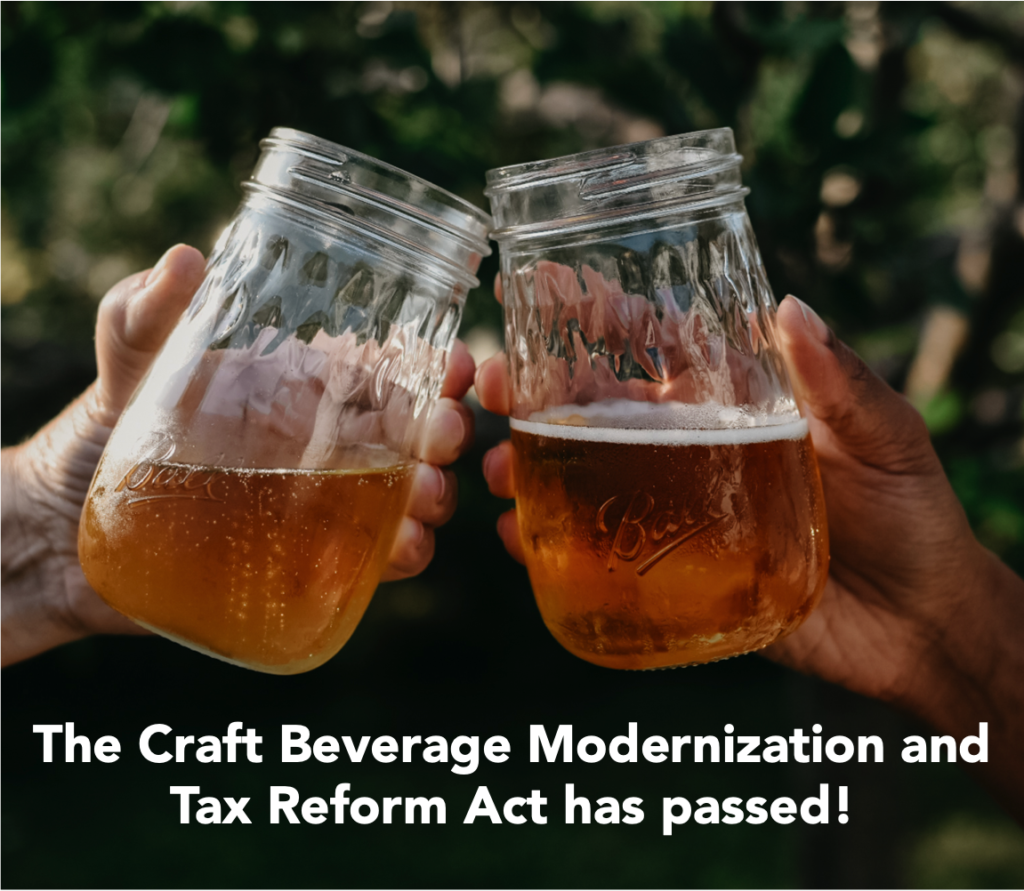
📣 ACTION ALERT: Renew the Craft Beverage Modernization and Tax Reform Act
Cideries like yours are facing the harsh economic realities of a global pandemic. Congress needs to be proactive in supporting small businesses like yours right now, but they also need to protect you from further economic harm. In a normal year, raising Federal Excise Taxes could significantly damage our industry’s viability. In 2021, raising taxes could force hundreds of cideries to permanently close their doors. Join us in urging Congress to act urgently and make the Craft Beverage Modernization and Tax Reform Act permanent NOW.
This will impact all segments of the cider industry. It’s critical we work together in reaching out to lawmakers today or come January 1, your Federal Excise Taxes may go up significantly.
Please reach out to Congress today and tell them your business needs a break: Make the Craft Beverage Modernization and Tax Reform Act permanent!
Stop Tax Increases
The Craft Beverage Modernization and Tax Reform Act EXPIRES at the end of 2019.
The Craft Beverage Modernization and Tax Reform Act created critical but temporary excise tax credits for beer, wine, spirit and cider producers. This cross-sector cooperation was unprecedented, and the results have been clear—our industries create jobs, support farms, and bolster community economies. Now we are working together again to prevent your taxes from going up come January 1. Congress needs to hear from the cider community that increasing federal excise taxes will cost. The resources that allowed you to invest in jobs, trees, equipment and innovations could go away overnight. Join us in telling Congress to stop these pending tax hikes and make the savings in the Craft Beverage Modernization and Tax Reform Act permanent.
From coast to coast, producers are making their voices heard. Our industries have two things in common—the vast majority of the businesses in our sectors are small, family-owned businesses, and our fermented products create added value for farms. These facts have led to overwhelming bipartisan support for the Craft Beverage Modernization and Tax Reform Act. But we need to hammer this message home: The loss of these credits will hurt local economies. Congress must act to make them permanent before it’s too late.
Want to learn more about how this bill impacts your cidery? Read our recent blog.


